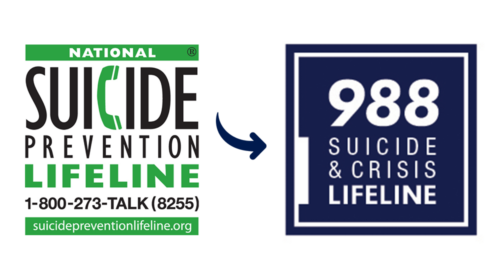List of Recommended BPD Resources
List of Recommended BPD Resources
Emergency Resources and Support

The National Suicide Prevention Lifeline is now: 988 Suicide and Crisis Lifeline
988 has been designated as the new three-digit dialing code that will route callers to the National Suicide Prevention Lifeline. While some areas may be currently able to connect to the Lifeline by dialing 988, this dialing code will be available to everyone across the United States starting on July 16, 2022.
Suicide & Crisis Lifeline: The Lifeline provides 24-hour, toll-free, and confidential support to anyone in suicidal crisis or emotional distress. Connect with a skilled, trained counselor at a crisis center in your area. Support is available in English and Spanish and via live chat.
Disaster Distress Hotline: People affected by any disaster or tragedy can call this helpline, sponsored by the Substance Abuse and Mental Health Services Administration, to receive immediate counseling. Call or text 1-800-985-5990 to connect with a trained professional from the closest crisis counseling center within the network.
Veterans Crisis Line: This helpline is a free, confidential resource for Veterans of all ages and circumstances. Call 1-800-273-8255, press “1”; text 838255; or chat online to connect with 24/7 support.
Crisis Text Line: Text HELLO to 741741 for free and confidential support 24 hours a day throughout the U.S.
Crisis Safety Plan: This form is a safety plan template to help those experiencing self-harm and suicidal thoughts.
Warm Line: A warmline is a phone number family members or people with lived experience can call to have a conversation with someone who can provide support during hard times. Whether you’re in crisis or just need someone to talk to, a warmline can help. Warmlines are staffed by trained peers who have been through their own mental health struggles and know what it’s like to need help.
Accurate and Honest Websites with Information on BPD
National Education Alliance for Borderline Personality Disorder (NEABPD) has the largest online media library of BPD resources where one can learn about BPD and refresh Family Connections™ skills.
National Institute of Mental Health’s mission is to transform the understanding and treatment of mental illnesses through basic and clinical research, paving the way for prevention, recovery, and cure. NIMH fulfills its mission by: Supporting and conducting research on mental illnesses and the underlying basic science of the brain and behavior.
McLean Hospital’s website continues various videos to learn about BPD, treatment methods and provide support putting people first in mental health.
NAMI provides advocacy, education, support and public awareness so that all individuals and families affected by mental illness can build better lives. In addition to the national organization, NAMI has local and state chapters that host support groups and education programs.
Mental Health America’s work is driven by its commitment to promote mental health as a critical part of overall wellness, including prevention services for all; early identification and intervention for those at risk; integrated care, services, and supports for those who need them; with recovery as the goal.
Books for Family Members Regarding BPD / Emotion Dysregulation
Loving Someone with BPD by Shari Manning
The High Conflict Couple by Dr. Alan Fruzzetti
Resources to Find a Therapist / Treatment Center that Treats BPD*
BPD Resource Center:Many people affected by BPD have difficulty finding adequate information online as well as a qualified mental health professional. The BPDRC provides information about BPD symptoms, common treatment op-tions, and resources for patients, families, and healthcare professionals. The BPDRC also maintains a database of providers nationwide with experience treating BPD and co-occurring disorders.
https://behavioraltech.org/resources/find-a-therapist/
https://dbt-lbc.org/index.php (Click on “consumers” and then find a certified therapist or program)
*NEABPD and Family Connections™ leaders can not recommend a specific therapist. We encourage you to interview a therapist and make sure it is the right match for your needs.
NonProfits that Promote BPD Research, Advocacy and Education
Emotions Matter was created by a network of families and individuals affected by borderline personality disorder (BPD) who have united around the mission of improving social connection, awareness and health care systems for those with BPD. Emotions Matter offers BPD peer to peer online support groups, materials in print, videos and social media communications from a BPD peer perspective of the disorder to diminish stigma and promote empowerment, creates resources to help families and individuals access treatment for BPD in mental health care systems and the community, offers a BPD loss support groups and BPD Loss Registry.
New England Personality Disorder Association‘s mission is to promote education, support and advocacy in the field of personality disorders, with a concentration on BPD. NEPDA sponsors workshops, conferences and small-group meetings for family members, friends and other loved ones, consumers of mental health services, professionals and the community at large in order to improve awareness of personality disorders and reduce the stigma which is often associated with them.
Families for Borderline Personality Disorder Research is a grassroots group of family members, friends, and others who have loved ones living with BPD who are committed to actively supporting BPD research as the best hope for recovery from this painful and devastating disorder.
National Education Alliance for Borderline Personality Disorder (NEABPD) provides education, raises public awareness and understanding, decreases stigma, promotes research, and enhances the quality of life of those affected by Borderline Personality Disorder and/or related problems, including emotion dysregulation through Family Connections, the largest media library of BPD resources, conferences and advocacy efforts. NEABPD brings together clinicians, researchers, family members and consumers to achieve its mission.
